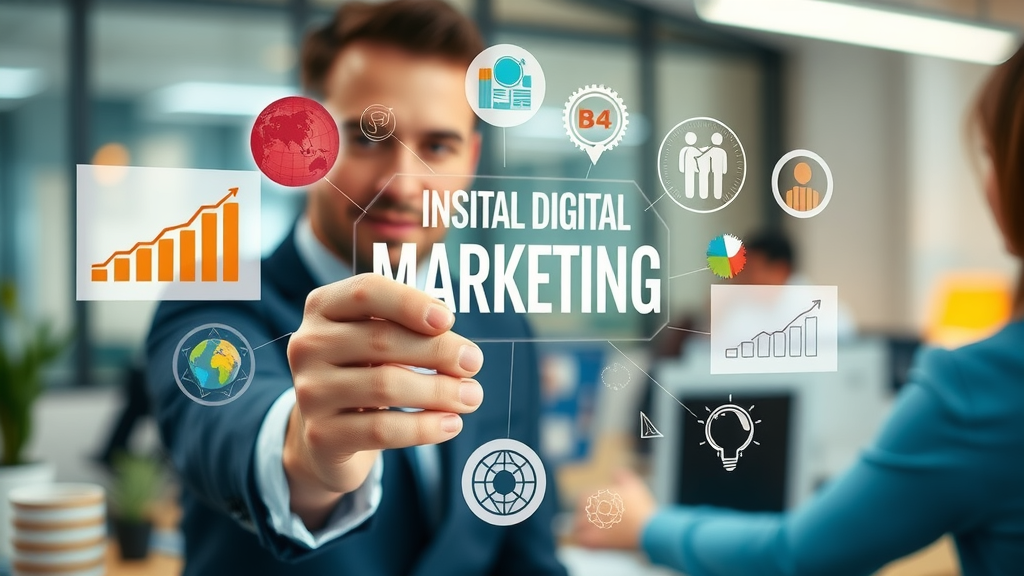Did you know that over 63% of businesses have increased their digital marketing budgets in recent years? In our digital age, understanding what digital marketing includes is not only crucial for businesses aiming to expand their reach but also for digital marketers looking to hone their strategies.
Understanding Digital Marketing: Overview and Importance
Defining Digital Marketing and Its Scope
Digital marketing encompasses promoting products or services through digital channels such as search engines, social media, email, and websites. At its core, digital marketing is about engaging potential customers using online platforms. This realm includes various strategies, such as search engine optimization (SEO) and content marketing, each playing a pivotal role in reaching the target audience effectively. The scope is continually evolving, reflecting changes in technology and consumer preferences.
The Importance of Digital Marketing in Today's Business Environment
The importance of digital marketing cannot be overstated. As businesses move towards digital transformation, the ability to market effectively online can be the difference between success and obscurity. By utilizing digital marketing, companies can increase brand awareness, engage with their audience on a personal level, and capitalize on marketing channels that offer measurable and actionable insights. According to industry reports, businesses using digital marketing experience over a 20% increase in revenue compared to those who do not.

Components of Digital Marketing
Exploring Digital Marketing Channels
- Search Engine Optimization (SEO)
- Content Marketing
- Social Media Marketing
- Email Marketing
- Affiliate Marketing
- Influencer Marketing
Each channel serves a specific purpose and offers unique advantages. For instance, SEO boosts visibility in search engines, crucial for higher rankings on the results page, while content marketing focuses on delivering valuable information to attract and retain customers. Social media marketing enhances brand visibility and engages audiences interactively. Email marketing, meanwhile, is excellent for nurturing leads with personalized communications, while affiliate and influencer marketing leverage partnerships to widen reach.
Integration of Traditional and Digital Marketing Strategies
Creating a cohesive marketing strategy involves integrating traditional marketing approaches with digital tactics to maximize reach and effectiveness. This combination enhances consumer experiences by bridging offline and online interactions, creating a seamless journey that influences potential customers. Traditional marketing still holds value in personal touchpoints, whereas digital marketing offers scale and data-driven adjustments.

Leveraging Data and Analytics in Digital Marketing
Data and analytics are the backbone of successful digital marketing campaigns. By analyzing consumer behavior and market trends, businesses can make informed decisions, tailoring their marketing efforts to meet the needs of their target audience. Tools like Google Analytics provide insights into traffic sources, user behavior, and conversion rates, enabling digital marketers to adapt strategies for optimal performance. This approach not only ensures efficiency but also boosts the ROI of the digital marketing strategy.
Effective Digital Marketing Strategies
Creating a Comprehensive Digital Marketing Strategy
A comprehensive digital marketing strategy involves understanding the core objectives of your business and aligning them with digital marketing efforts. This requires a thorough analysis of the current digital landscape, competition, and consumer behavior. Digital marketers need to craft strategies that balance diverse marketing channels, ensuring cohesive brand messaging and consistent engagement.
Targeting the Right Audience Through Social Media
Social media platforms are invaluable for targeting specific demographics. By leveraging tools like Facebook Ads and Instagram Analytics, businesses can pinpoint their ideal customers, engage them with relevant content, and foster a brand community. Understanding audience preferences and behaviors allows digital marketers to create impactful campaigns that resonate and drive conversions. Customizing messages to appeal to specific segments enhances engagement and strengthens brand loyalty.

Email Marketing: Personalization and Automation
Email marketing remains a powerful tool in digital marketing when paired with personalization and automation. Personalization involves tailoring email content to individual consumer behaviors and preferences, leading to higher engagement rates. Automation simplifies the process of sending targeted messages at optimal times, ensuring maximum impact. The combination of these tactics can significantly enhance customer experiences and drive sales.
The Role of Content in Engaging Customers
Content marketing is crucial for engaging customers and establishing brand authority. High-quality content attracts, informs, and retains customers by delivering relevant and valuable information. This strategy not only improves SEO but also builds trust and credibility. Regular blog posts, engaging videos, and informative infographics are just a few tactics that can invigorate your content marketing efforts.
The Power of Affiliate and Influencer Marketing
Influencer marketing leverages trusted personalities to promote products or services, humanizing your brand and extending its reach. Affiliate marketing works similarly, where partners promote your offerings for a commission. Both strategies can significantly impact brand visibility and credibility when executed correctly, ensuring alignment with the brand's values and target audience is crucial for success.

Optimizing Search Engine Marketing
Search engine marketing (SEM) is a paid strategy that enhances online visibility. Utilizing platforms like Google Ads allows digital marketers to bid on keywords, increasing the chances of appearing in search engine results. Coupling SEM with SEO efforts ensures a robust online presence, capturing both organic and paid traffic. Continuous testing and optimization of ad campaigns are essential for maximizing ROI.
Tools and Technologies in Digital Marketing
Understanding Key Digital Marketing Tools
Numerous tools are available to optimize digital marketing efforts. Google Analytics offers insights into website performance, while SEMrush and Moz provide keyword research and SEO tracking capabilities. Tools like HubSpot and Mailchimp help manage customer relationships and execute email campaigns efficiently. Selecting the right tools depends on your strategic goals and the complexity of your digital marketing strategy.

Leveraging Emerging Technologies for Growth
Emerging technologies such as artificial intelligence (AI) and machine learning are transforming digital marketing by offering personalized content recommendations and predictive analytics. These technologies allow businesses to anticipate consumer needs and provide tailored experiences, leading to higher engagement and conversion rates. Staying abreast of these trends is vital for sustained growth in an increasingly digital world.
Best Practices for Successful Digital Marketing
Adopting a Customer-Centric Approach
A customer-centric approach focuses on delivering exceptional experiences throughout the buyer's journey. By understanding customer needs and preferences, businesses can tailor their services and communications to enhance satisfaction and loyalty. This approach requires continuous feedback, ensuring offerings align with evolving customer expectations.
Maximizing ROI Using Data-Driven Decisions
Data-driven decisions empower businesses to optimize their marketing strategies for maximum ROI. By analyzing metrics and performance data, digital marketers can refine campaigns and allocate resources to the most effective channels. This approach not only enhances efficiency but also ensures that marketing efforts align with business objectives.

Ensuring Compliance and Ethical Practices
Ensuring compliance with legal standards and ethical guidelines is critical in digital marketing. Transparency and respect for consumer privacy build trust and prevent legal issues. Following industry standards regarding data protection and advertising honesty protects the brand's reputation and fosters a trustworthy relationship with consumers.
Building Brand Advocacy and Trust
Building brand advocacy involves nurturing loyal customers who willingly promote your brand. This is achieved through excellent customer service, engaging content, and consistent value delivery. Trust is pivotal; when customers believe in your brand, they become advocates who influence others, extending your brand's reach through positive word-of-mouth.

People Also Ask
What are the 7 areas of digital marketing?
Explore the core domains and their impact on businesses.
The seven key areas of digital marketing are SEO, content marketing, social media marketing, email marketing, affiliate marketing, influencer marketing, and online advertising. Each domain contributes uniquely to the overall strategy, from enhancing brand visibility to driving engagement and sales.
What does digital marketing involve?
A detailed look at components and processes in digital marketing.
Digital marketing involves several components, from understanding your target audience to crafting compelling content and choosing suitable platforms for dissemination. The process includes strategic planning, execution, monitoring, and optimization to ensure desired outcomes are met, enhancing brand awareness and driving conversions.
What are the 7 elements of digital marketing?
Identify essential elements and best practices.
The seven critical elements of digital marketing include a well-defined strategy, targeted audience understanding, engaging content, effective use of digital channels, robust analytics, responsive web design, and ongoing optimization. These elements collectively contribute to a successful digital marketing strategy.
What are the 7 pieces of digital marketing?
Breakdown the comprehensive components of digital marketing.
The seven pieces of digital marketing encompass strategy, content creation, social media management, email marketing, search engine marketing, data analysis, and customer engagement. Integrating these components leads to a holistic approach that can significantly boost business success.

Incorporating Social Media into Marketing Strategy
The Role of Social Media in Enhancing Brand Image
Social media plays a pivotal role in shaping brand image. Platforms like Instagram, Facebook, and Twitter allow brands to interact with their audience directly, showcase their values, and build authentic connections. By maintaining a consistent and engaging presence, brands can enhance their image and increase loyalty.
Analyzing Social Media Metrics and Their Impact
Analyzing social media metrics such as engagement rates, reach, and audience demographics provides valuable insights into campaign effectiveness. These analytics help digital marketers understand what resonates with their audience, enabling the optimization of future marketing efforts and ensuring messages are effectively communicated.
Social Media Campaigns: Case Studies and Examples
Examining successful social media campaigns provides actionable insights into strategy formulation. Case studies reveal creative approaches and innovative tactics that led to increased brand engagement and broad outreach. Leveraging these examples can guide marketers in crafting their own compelling campaigns that capture audience interest and drive results.
Adapting to Changes in Digital Marketing
Staying Ahead with Emerging Trends and Technologies
Keeping pace with emerging trends and technologies is essential for maintaining a competitive edge. Innovations such as AI, augmented reality, and voice search are reshaping the digital marketing landscape. Staying updated on these developments helps businesses adapt swiftly, ensuring sustained relevance in the market.
Responding to Consumer Behavior Shifts
Consumer behavior is continuously evolving, influenced by technological advancements and cultural shifts. Monitoring and responding to these changes are critical for maintaining consumer engagement. Businesses that adapt their strategies to align with new consumer expectations will remain ahead of the curve.
Future of Digital Marketing: Predictions and Insights
The future of digital marketing is poised for increased personalization, data-driven decision-making, and integration of advanced technologies. As digital components become even more intricate, businesses that embrace innovation and maintain flexibility will lead in appealing to the modern consumer effectively.
Tables
Comparison of Major Digital Marketing Channels and Their Benefits
| Channel | Benefit |
|---|---|
| SEO | Improves search engine rankings and organic visibility |
| Content Marketing | Engages audience with valuable information, builds trust |
| Social Media Marketing | Increases brand awareness, facilitates audience interaction |
| Email Marketing | Nurtures leads, enhances customer relationships |
| Affiliate Marketing | Expands reach through partner promotions |
| Influencer Marketing | Leveraged trusted influencers to endorse products |
Impact of Different Marketing Strategies on Target Audience
| Strategy | Impact |
|---|---|
| SEO | Increases targeted traffic |
| Social Media Campaigns | Enhances engagement and builds community |
| Email Newsletters | Boosts retention and loyalty |
| Content Marketing | Nurtures prospects and informs decision-making |
Quotes
"Digital marketing is not an art of selling a product. It's the art of making people buy into your brand." – Anonymous
"In today’s modern age, businesses must be going digital in order to thrive and reach new heights." – Marketing Expert
Conclusion and Final Thoughts
Summarizing Key Points on Digital Marketing
Digital marketing is an ever-evolving field requiring dynamic strategies and an understanding of diverse components. From social media marketing to search engine optimization, each aspect plays a critical role in elevating brand presence and capturing the target audience.
Actionable Steps to Enhance Your Digital Marketing Strategy
Review your current strategy, identify gaps in engagement, and focus on integrating emerging technologies. Use data insights to optimize campaign performance and ensure compliance with industry standards. Amplify your outreach through personalized, ethical marketing tactics that resonate with your audience.

Call to Action: Implementing Digital Marketing in Your Business
Consider implementing these strategies in your digital marketing campaigns to enhance your reach and impact. Tailor your approach to align with your brand's values and your target audience's expectations. Deploy a flexible and innovative strategy that adeptly navigates the digital landscape.
 Add Row
Add Row  Add
Add 




Write A Comment